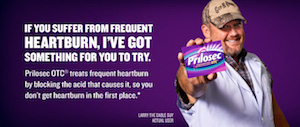
The problem may lie with the way warnings are currently presented on acid reflux medications. Labels often direct patients to consult their doctor before taking the drugs, but do not clearly address any dangers associated with long-term use or the possibility of cancer.
Prolonged use of the drugs could cause cellular damage to the lining of a patient’s esophagus. Over time, their symptoms of acid reflux may go away, leading them to stop taking the medications all together. But according to Mindy Mordecai, who started ECAN after her husband died of Barrett’s esophagus, “if you get rid of your symptoms, you are not getting rid of your risk.”
Barrett’s esophagus evolves as part of a bodily defense mechanism. Treatment can involve putting a tube down a patient’s throat and using radiofrequency energy to thicken and strengthen the lining of their esophagus. This prevents food and stomach acid from backing up. But the disease often isn’t caught until later stages, when this method is less effective.
“We want something that is much bolder and stronger than is on packaging now,” says David Rosen, a former FDA lawyer who is filing a petition with the agency on behalf of ECAN to change labels on OTC acid reflux medication.
AstraZeneca, the manufacturer responsible for developing Nexium and Prilosec, has stated its confidence in the safety of their medications. However, the same drugs have also been connected to kidney disease and failure in addition to Barrett’s esophagus. While such medications can be helpful, they may also expose consumers to serious danger if used over prolonged periods of time.
The FDA will be reviewing ECAN’s petition. If proof is established that current warnings on over-the-counter acid reflux medication are a public health problem, the agency will hold a hearing to determine how to improve them. Until then, consumers should be aware that they may remain at risk.
